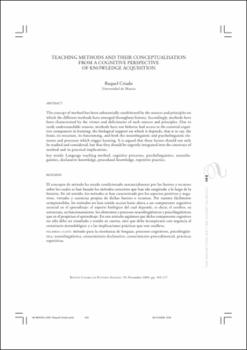Teaching methods and their conceptualisation from a cognitive perspective of knowledge acquisition
Author
Criado, RaquelDate
2009Abstract
El concepto de método ha estado condicionado sustancialmente por las fuentes y recursos
sobre los cuales se han basado los métodos concretos que han ido surgiendo a lo largo de la
historia. En tal sentido, los métodos se han caracterizado por los aspectos positivos y negativos,
virtudes y carencias propias de dichas fuentes o recursos. Por razones fácilmente
comprensibles, los métodos no han tenido acceso hasta ahora a un componente cognitivo
esencial en el aprendizaje: el soporte biológico del cual depende, es decir, el cerebro, su
estructura, su funcionamiento, los elementos y procesos neurolingüísticos y psicolingüísticos
que en él propician el aprendizaje. En este artículo argüimos que dicho componente cognitivo
no sólo debe ser estudiado y tenido en cuenta, sino que debe incorporarse con urgencia al
constructo metodológico y a las implicaciones prácticas que este conlleva. The concept of method has been substantially conditioned by the sources and principles on
which the different methods have emerged throughout history. Accordingly, methods have
been characterised by the virtues and deficiencies of such sources and principles. Due to
easily understandable reasons, methods have not hitherto had access to the essential cognitive
component in learning: the biological support on which it depends, that is to say, the
brain, its structure, its functioning, and both the neurolinguistic and psycholinguistic elements
and processes which trigger learning. It is argued that these factors should not only
be studied and considered, but that they should be urgently integrated into the construct of
method and its practical implications.





